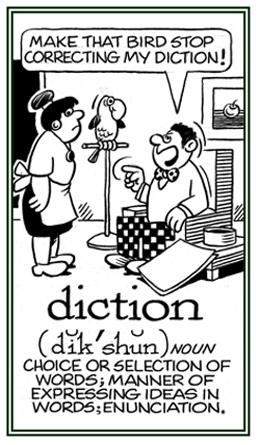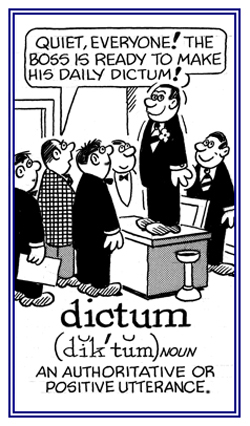dictatorialism
(s) (noun), dictatorialisms
(pl)
An arrogant practice; a negative method of action or behavior: "The company supervisor was known for his occasional dictatorialism and this resulted in many of his employees resenting his harsh treatment."
dictatorially
(adverb), more dictatorially, most dictatorially
In an overbearingly, domineering manner: "The group of teenagers Mr. Scott had to teach in school were extremely overactive and disruptive; so, because of this he had learned to treat them in a dictatorially stern manner."
diction
(s) (noun) (no plural)
1. The manner in which something is expressed in words: The TV reporter's
diction made his choice or selection of words and phrases very easy to understand.
2. A verbal style of writing or speaking: The politician's speech was so full of careless
diction that no one considered him qualified and so he lost the election.
3. Etymology: from Latin
dictio, "mode of expression, a saying"; from
dicere, "to speak, to say".
 © ALL rights are reserved.
© ALL rights are reserved.
Go to this Word A Day Revisited Index
so you can see more of Mickey Bach's cartoons.
dictionarian
(s) (noun), dictionarians
(pl)
A maker of lexicons; a lexicographer: "It takes many, many years for a dictionarian to compile words, parts of speech, definitions, example sentences, and, if possible, etymologies of these words.”
dictionary
(s) (noun), dictionaries
1. A book dealing with the individual words of a language, or certain specified classes of them, so as to set forth their orthographies, pronunciations, their synonyms, derivations, and histories; or at least some of these facts. "For the convenience of references, the words in dictionaries are usually arranged in some stated order; such as, alphabetically, etc."
“In most schools, English teachers have their students learn to use a dictionary to look up unknown vocabulary words which they can use in their essays."
2. Etymology: from Latin
dictio-, "the act of speaking"; and
dictionarius, "a collection of words".
When one word leads to another, it generally ends up in a quarrel, a speech, or a dictionary.
—E.C. McKenzie
A dictionary is the only place where happiness can always be found.
—Evan Esar
An excellent book that can be hard to read because it changes the subject so often.
—Evan Esar
 Dictionary sources of information:
Dictionary sources of information:
dictionary of lexicomedy
(s) (noun), dictionaries of lexicomedies
(pl)
A publication that is bound to provide humor which emphasizes linguicomedy or definitional wit: "A dictionary of lexicomedy provides examples of facetious or humorous definitions."
dictionary, glossary, lexicon, thesaurus
dictionary (DIK shuh ner" ee) (
noun)
A book containing the alphabetical listing of words used in a language, providing definitions, pronunciations, etc.: She received a new English dictionary when she graduated from high school.
glossary (GLAH suh ree, GLOS uh ree) (
noun)
A collection of specialized words and their meanings: There was a glossary at the end of the book to help the reader understand the text.
lexicon (LEK si kahn", LEK si kon") (
noun)
Another term for "dictionary" which includes any book typically containing all the morphemes (smallest meaningful parts) of a language: The scholar sought a lexicon in the library to assist her in writing her thesis on the Gaelic language.
thesaurus (thi SAUR uhs, thi SOR uhs) (
noun)
A book containing a store of words; especially, of synonyms and antonyms arranged in categories: Linda and Greg found out that there was more than one kind of thesaurus available to find logical structures and word associations.
While Jill was looking up synonyms in the thesaurus, she also consulted a new dictionary which was helpful in that it had a special glossary of specialized words which she had not seen when she reviewed the old lexicon that her friend had given to her.
dictioneer
(s) (noun), dictioneers
(pl)
Someone who makes it his or her business to criticize the styles used in language: "While reading through an article which was to be presented in a scientific magazine, the dictioneer found many aspects of phrasing in the composition which needed improving.”
dictum
(s) (noun), dicta
(pl)
1. A saying or utterance: sometimes used with emphasis upon the fact that it is a mere saying; but more often with the implication of a formal pronouncement claiming or carrying some authority: Medical doctors are required to follow the
dictum of "First, do no harm."
2. A short statement that expresses a general truth or principle: There is an old
dictum which states that blood is thicker than water.
3. A thing that is generally said; a current saying; a maxim: The elderly woman had a
dictum that stated that, "The best thing about the future is that it comes only one day at a time."
4. In Law, an expression of an opinion by a judge on a matter of law, which is not the formal resolution or determination of a court: The judge repeated his legal brief as if it were the
dictum of a higher court.
5. Etymology: derived from the Latin word
dicere, "to say".
 © ALL rights are reserved.
© ALL rights are reserved.
Go to this Word A Day Revisited Index
so you can see more of Mickey Bach's cartoons.
ditto
(s) (noun), dittos
(pl)
1. A mark; such as, (") which is used to indicate the word above it should be repeated: "When filling out the application form for a job, Alfred used dittos to show that the information which was wanted was the same as that which he had just written in the space above it."
2. Used instead of repeating something that has just been said to indicate that the same thing applies to you; such as, "I was bored with that speech." "Ditto for me, too."
3. A duplicate; a copy: "It was amazing! The son was a complete ditto of his father!"
4. Etymology: from Tuscan dialect
ditto, "(in) the said (month or year)"; from Italian
detto, past participle of
dire, "to say"; from Latin
dicere, "a saying, an expression, a word"; from
dic-, stem of
dicere, "to speak, to tell, to say".
Originally, "ditto" was used in Italian to avoid the repetition of month names in a series of dates; generalized meaning of "same as above" was first recorded in English in 1678.
ditto mark
(s) (noun), ditto marks
(pl)
A sign (") indicating a repetition which is usually put under a word, a number, or a passage that is supposed to be repeated: "Since there were so many words that were the same for each answer in the survey, Josh used ditto marks to indicate which ones were the same as the ones shown above."
Marcus filled out answers for numbers 2-4 with ditto marks:
- Do you like ice cream? Yes
- Do you like chocolate candy? "
- Do you like cookies? "
- Do you like apple crumble? "
dittogram
(s) (noun), dittograms
(pl)
A letter or a series of letters unintentionally repeated by a writer when reproducing a text: "As a reporter, Jane was under pressure to complete several articles as quickly as possible. Before submitting her work for publication in the newspaper, she saw some dittograms, or written duplications of letters and phrases, and so she corrected them."
dittograph
(s) (noun), dittographs
(pl)
1. A passage containing accidentally reduplicated syllables, letters, etc.: "Although the secretary had a terrible headache that day, her boss made her type up the letter he had dictated to her earlier. After reading it again, she found many dittographs which appeared throughout the last paragraph which had to be corrected."
2. A letter or word that is repeated unintentionally in writing or when copying written contents: "While Mary was reading through her thesis, she found some mistakes, including dittographs which somehow reappeared on every page!"
dittographic
(adjective), more dittographic, most dittographic
1. Descriptive of a mistaken repetition of letters, words, or phrases, by a writer or someone who reproduces written material: "As a professional editor of short stories and novels, Sam had to be aware of dittographic contents when authors submit their creations to him."
2. Etymology: from Latin dittos, "double"; from dictus a form of dicere, "to say" + Greek graphien, "to scratch, to draw", then Greek graphikos, "write" and via Latin graphicus, graphe, "writing, drawing".
dittography
(s) (noun), dittographies
(pl)
1. Double writing; the unintentional repetition of a letter or a word, or a series of letters or words, by a copyist: "The written material had some dittographies, or unintentionally repeated words, all of which had to be deleted from the context or be corrected."
2. Etymology: from Greek dittos, "double" + graphy; from Greek -graphia, "writing, drawing".

![]() Dictionary sources of information:
Dictionary sources of information:



